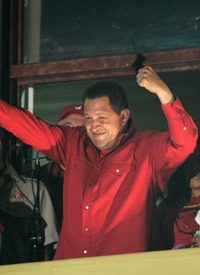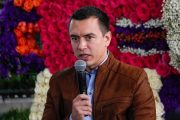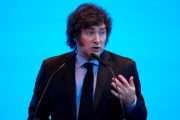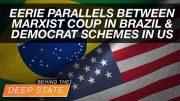
Chávez, who is up for reelection in 2012, is furious at the rice industry for refusing to produce rice at prices set by the government. Chávez complained that prices were high despite increased production by government-owned rice farms because “some companies are refusing to follow the government’s rules.” According to Chávez, there is no excuse for shortages. The government farms even got new machinery. "I have ordered the immediate intervention in all those sectors of agro-industry, intervention by the revolutionary government,” he announced on national television. "This government is here to protect the people, not the bourgeoisie or the rich." He also threatened to nationalize other firms if they interfered with the supply of grain. "I will expropriate them, I have no problem with that, and I’ll pay them with bonds,” he said without mentioning any specific firms. “Don’t count on me paying with hard cash." Some firms could even be taken over without compensation. A decree issued last year allows Chávez to jail the owners of companies for “hoarding” food.
His threats should be taken seriously. In his weekly Hello President program after winning the referendum on term limits, Chávez emphasized the need to strengthen and consolidate the socialist gains in the 21st century. He has already taken over a large share of the private sector, ranging from Mexican cement giant Cemex and the cement industry to electricity companies and other utilities to telecommunications and even a bank. The government technically still owes billions for all the assets it seized. He uses the vast profits from the nation’s oil exports to further his agenda as well, subsidizing fuel for Venezuelans and expanding government programs. Foreign oil firms were forced into joint ventures. Aiming to control the effects of runaway inflation, he has also imposed price controls on everything from pasta and cooking oil to milk.
“This is a process of the state absorbing different distribution and production chains that they consider strategic,” explained economist Carlos Machado Allison from the Caracas business school Instituto de Estudios Superiores de Administracion. “This will only exacerbate food inflation and drive the little private investment that’s left away.” Among the firms processing rice in Venezuela is U.S.-based Cargill, one of the largest privately owned companies in the world. Officials from the Ministry of Agriculture confirmed that Venezuelan giant Polar had already been seized and that production was being supervised by the government.
“It has become customary for the Chávez administration to launch new offensives after each election,” according to VenEconomy, a consulting firm that provides financial, political, and economic data. It seems Chávez is using his narrow “mandate” to press forward with the government takeover of the economy. "With today’s victory, we start the third cycle of the Bolivarian revolution, from 2009 to 2019," Chávez explained after winning the right to run for office again. But his revolution is already showing its fruits: shortages, poverty, more government and less freedom. What Chávez really means is he will continue doing his best to give out free goodies — the source of much of his political support. But with oil prices back down after reaching record heights last year, Chávez’s coffers are no longer bursting with oil money.
Perhaps the inflation and the most recent onslaught of state force will cause Venezuelans to think twice before casting their vote for Chávez again. The results of his policies are becoming increasingly obvious as time goes on. So, it is to be hoped that the Venezuelan people will wake up before Chávez and the government entirely destroy the economy and turn it into another Cuba. Who knows what Chávez would do if he won yet another election or referendum.
Photo: AP Images



